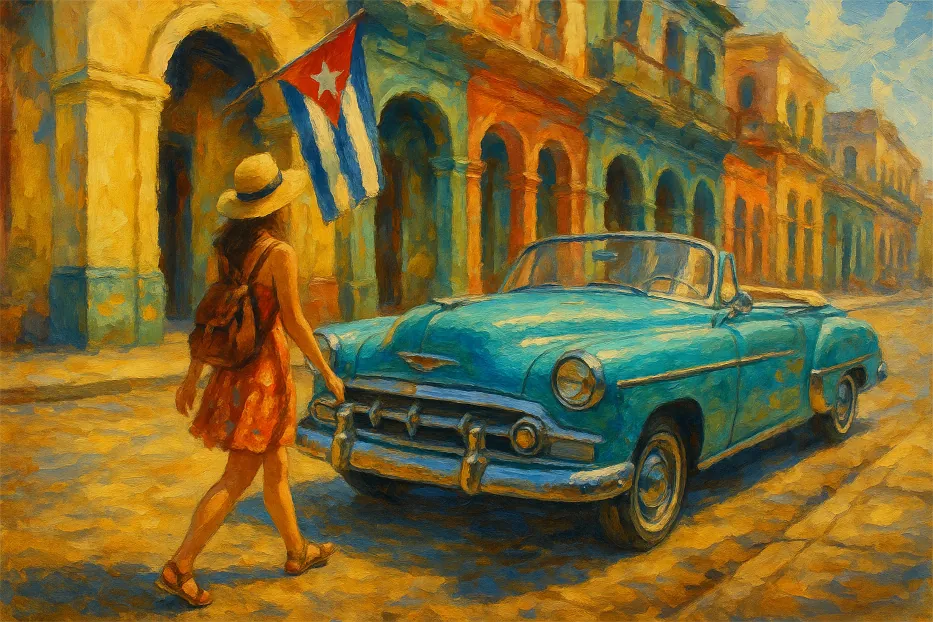Cuba stands out as one of the Caribbean’s most captivating destinations, offering a unique blend of rich history, vibrant culture, and stunning natural landscapes.
Whether you’re planning a getaway or simply curious about what life is like on the island, this in-depth guide explores the most frequently asked questions from travelers around the world.
As the country continues to change and adapt, it remains a land of striking contrasts—resilient yet resource-limited, politically controlled yet culturally alive. Whether you’re visiting out of curiosity or seeking a deeper travel experience, exploring Cuba offers rare insight into a nation defined by endurance, identity, and warmth.
Table of Contents
Can Tourists Still Travel to Cuba?
Yes, tourism is open and thriving. Most international visitors—including Europeans, Canadians, and Latin Americans—can enter with minimal restrictions. Travelers from the United States face more complicated regulations. While visiting is permitted under certain categories (such as educational travel or family visits), traditional tourism is technically prohibited under U.S. law.
Despite this, many Americans still travel through third countries like Mexico or Panama. It’s essential to research current entry rules before booking your flight.
Is the Country Safe for Travelers Right Now?
Safety is one of the reasons people continue to visit. Violent crime rates are low compared to other Latin American nations. Petty theft can occur in busy areas, but overall, the streets are calm, even at night. Police presence is strong in tourist zones, and local people are generally helpful and friendly.
That said, be aware of common scams, especially in major cities, and avoid unofficial taxi services.
How Expensive Is It to Visit?
Cost depends heavily on your travel style. Budget travelers who eat at local restaurants and stay in private homes (casas particulares) can get by on as little as $40–$60 per day. Mid-range travelers should expect to spend between $70–$120 daily, while luxury stays can cost $150 or more.
Flights, especially from North America or Europe, tend to be moderately priced, but imported goods on the island (like bottled water, snacks, and toiletries) can be expensive due to limited availability.
What Currency Do Visitors Use?
Cuba’s only official currency is the Cuban Peso (CUP), but many transactions—especially in tourist areas—are priced in U.S. dollars or euros. Although the Cuban Convertible Peso (CUC) was phased out in 2021, dual pricing systems still exist.
Exchange rates can vary dramatically between the official rate and the informal market. As of mid-2025, the unofficial exchange rate is approximately 300–350 CUP per U.S. dollar. Tourists often rely on cash, as ATMs can be unreliable, and foreign cards are frequently declined.
Tip: Always bring crisp bills in small denominations for easier transactions.

Daily Expenses: What to Expect
- Bottle of water: 100–150 CUP
- Meal at a local restaurant: 500–700 CUP
- Basic taxi ride in Havana: 400–600 CUP
- Internet recharge (1 GB): $2–$4 USD
- Tip for hotel staff or taxi: $1–$3 USD is appreciated
Tipping in foreign currency is welcomed, and even a small amount can go a long way.
Is Cuba Still a Communist State?
Yes. The government maintains a one-party socialist system led by the Communist Party. Since the revolution of 1959, the island has been under communist rule. While some market reforms have allowed for limited private enterprise (like small restaurants and private rentals), key industries and services are still state-controlled.
Who Is in Power Now?
Miguel Díaz-Canel serves as the President and First Secretary of the Communist Party, taking over leadership from Raúl Castro. Though leadership has shifted to a new generation, political change has been slow, and the country remains centralized in both governance and economic planning.

Do Locals Have Internet Access?
Internet service has improved in recent years. Wi-Fi is available in hotels, parks, and public hotspots, and mobile data is increasingly accessible. However, speeds are slower than in most countries, and many websites are partially restricted. Apps like WhatsApp, Telegram, and Signal are popular ways to communicate.
Can Residents Travel Abroad?
Cubans can legally leave the country and travel internationally, but the process can be complex. They often need a visa, proof of funds, and an invitation from someone abroad. Economic constraints and emigration policies have led many to seek permanent relocation for better job prospects and quality of life.
What Is Daily Life Like for Citizens?
Life on the island is a paradox. On one hand, there’s universal healthcare, free education, and low crime. On the other, there are widespread shortages, poor infrastructure, and low salaries—often equivalent to $30–$40 per month. Many families rely on remittances from relatives abroad or work in the informal economy.

Are Locals Friendly to Visitors?
Absolutely. People are known for their warmth, hospitality, and resilience. You’ll often be greeted with smiles, music, and genuine curiosity. English is spoken in tourist areas, but learning a few Spanish phrases will enhance your experience significantly.
Why Do People Leave the Country?
Economic hardship, limited freedoms, and the desire for better opportunities drive emigration. Thousands have relocated to the United States, Europe, or Latin America in search of work, education, and more personal freedom. Despite this, national pride remains strong, and many return to visit family or invest in local businesses.
Is Tourism Helpful or Harmful?
Tourism is both a lifeline and a challenge. It brings vital income and jobs but also contributes to economic inequality and dependence on foreign visitors. Popular areas often receive better services, while rural or less-visited regions are left behind.
Still, tourism encourages cultural preservation and international exchange, making it a complex but essential part of the economy.

Is Cuba Worth Visiting in 2025?
For travelers interested in history, culture, music, and unique landscapes, the answer is yes. The blend of colonial cities like Trinidad, tobacco valleys in Viñales, and white-sand beaches in Varadero offers a diverse experience. Add to that the warm people, vintage cars, and timeless ambiance, and it’s clear why many consider it a destination like no other.

